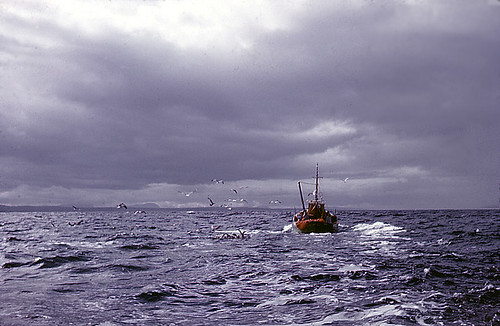 The Scottish fishing industry is developing new and innovative designs of prawn trawls that significantly reduce discards of whitefish such as cod. The designs represent a new approach to fisheries management where fishermen fed up with unworkable European regulations have taken matters into their own hands to deliver effective conservation.
The Scottish fishing industry is developing new and innovative designs of prawn trawls that significantly reduce discards of whitefish such as cod. The designs represent a new approach to fisheries management where fishermen fed up with unworkable European regulations have taken matters into their own hands to deliver effective conservation.Working in partnership with the Scottish Government, the new designs of prawn trawl have achieved reductions of over 60% of cod caught when compared to a standard trawl, with one of the designs having the ability to reduce the cod by-catch by 87%.
Trials conducted by the Scottish Fishermen’s Federation have also shown that the new trawls can achieve a 67% reduction in haddock and 64% fall in whiting, as well as achieving the required reductions in the cod catch.
Two of the approved designs are now being utilised by the Scottish prawn fleet – the ‘Flip-Flap’ trawl developed by Gamrie Bay Prawn Trawls in Gardenstown, and the Faithlie ‘Cod Avoidance Panel’ net developed by Faithlie Trawl of Fraserburgh. These two designs are similar in that they incorporate variations of internal panels to direct fish towards escape holes at the top of the net.
Several other trawl designs are in the process of being trialled and approved by Marine Scotland Science. These incorporate a variety of technical features, including a reduction in the area of netting at the top of the net and the use of square mesh panels in the trawl to facilitate the escape of small fish. The whitefish which remain in the net are covered by the boat’s fish quota for the mixed fishery, keeping discards down to a minimum.
The initial spur for the development of these trawls was a means of allowing increased fishing days for the fleet. Under the EC’s long term management plan for cod, the Scottish fleet has been caught in a stranglehold of automatic annual reductions in the number of days it can put to sea, which was doing little towards conserving the cod stock whilst at the same time placing an intolerable economic burden on the fleet. In a deal brokered by the Scottish and UK Governments, boats that use these new nets are able to ‘win’ back extra fishing days.
Skipper James Reid of the fishing vessel Horizon said: “The Scottish fishing industry hit the ground running in developing these new trawl attachments. The aim is to deliver an over 60% reduction in the cod catch whilst retaining prawns, and this has been achieved. But it is still very much work in progress as far as refining the designs is concerned as we need to get the balance right of not losing too many other marketable fish species for which we have legitimate quota for.
“There are also some issues that still need to be overcome from debris that can get caught in the inclined panels during fishing. But given the short timescale available in developing these trawls, the Scottish fishing industry has really risen to the challenge.”
Skipper Sandy West of the fishing vessel Virtuous is working closely with Fraserburgh based netmaker Scotnet in developing another design option known as the ‘Scotnet Internal Cod Flap’. The design is currently undergoing assessment and it is anticipated it will gain official approval soon.
Sandy West said: “At considerable expense, the Scottish fishing industry has gone the extra mile to develop and implement these new trawl designs. In my own case, I have been involved for over 20 months in developing a design that meets the requirements of our boat and the type of fishing grounds we operate in. We are happy with the progress and are gaining knowledge for the future all the time.”
Bertie Armstrong, chief executive of the Scottish Fishermen’s Federation, says: “This is very much a case of fishermen taking matters into their own hands and delivering effective fish stock conservation.
“The governing regulation for cod recovery has long been widely recognised by scientists, fisheries managers and the industry as being fatally flawed and these trawl designs show what can be achieved if fisheries management is placed under regional stakeholder control.
“In the future the industry will continue to take a lead role in the development of selective gears for both the whitefish and prawn fleets.”
The Scottish fishing industry is also intent on exploring other options to reduce discards – and is already participating in a management scheme involving real-time area closures to avoid aggregations of spawning fish. According to independent scientific body ICES (International Council for the Exploration of the Sea) the majority of assessed fish stocks in the north-east Atlantic are now recovering.
Source: FishUpdate.com
Image courtesy of PhillipC via Flickr (CC BY 2.0)
